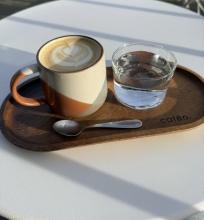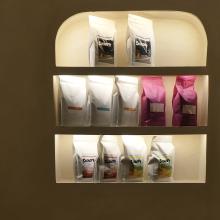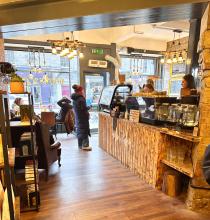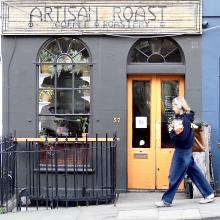
Charlie Ellis sips and considers …
Artisan Roast were one of the pioneers of specialty coffee in Edinburgh.
Having started in 2007, they now have four shops across the city and a well-respected roastery in Peffermill.
Their first shop, on Broughton Street, remains popular to this day. It’s somewhat unique among ‘serious’ Edinburgh coffee spots, with an unusual vibe.
Social mixes
It’s very noticeable that in different types of coffee shop, you find a very different social mix. So, for example, those you might see in a typical Costa differ from those in a specialty coffee venue, who would be different again from the sort you might encounter in a typical local café or greasy spoon.
This social segregation is also manifested in the perceived snobbishness of some specialty coffee places. For instance, The Source, on Spittal Street, is widely considered one of Edinburgh’s very best coffee spots.
However, its practice of not serving sugar (on the basis that their coffees contain sufficient natural sweetness) or lattes (because the quantity of milk camouflages any coffee flavour) might be perceived as a little disdainful. (Don’t mention flavoured syrups!)
Some might see all this as evidence of a fractured society, with very few truly shared spaces. But segregation is also evident within the specialty coffee scene itself.
Different vibes, different tribes
This is apparent in the way that the environment has evolved since it began in Edinburgh around 2008 with the emergence of the (originally Australasian) flat white culture.
Not all specialty coffee places are alike, although recognisable aesthetics have emerged which themselves go through various ‘iterations’.
When specialty coffee was in its infancy (up to around 2012), the aesthetic was often harsh, occasionally with an industrial vibe. The furniture was sometimes somewhat haphazard, with comfort not the first consideration. ‘Found’ and repurposed furniture and fittings were to the fore. Quirkiness was the watchword.
More recently, most places have become far sleeker and with more of an intentional design. In particular, we have seen the rise of Scandinavian-influenced features in the wood and the general minimalistic mode.
This has led to a certain uniformity among coffee shops, with some of the chains joining in. The aesthetic is typified by the ‘indie chain’ Blank Street, which recently arrived in Edinburgh (on Victoria Street and Princes Street/Hanover Street). These are places which seem designed for Instagram. Cluttered quirkiness is now rare.
In Edinburgh, commercial interior design by SPLINTR has led the trends. This Leith-based agency has been involved in a great number of contemporary cafés and eateries. Though their designs are bespoke, there are common features such as the wood used and table design. It’s usually clear when you’ve entered a SPLINTR place.
Origin Coffee, next to Old College on South College St, has the distinction of being ‘twice-SPLINTRed’. SPLINTR did the interior for its predecessor Brew Lab, as well as the recent revamp. The two interiors manifest different specialty coffee eras. Brew Lab had a darker, more industrial vibe, while Origin is smoother and softer, with greater mainstream appeal.
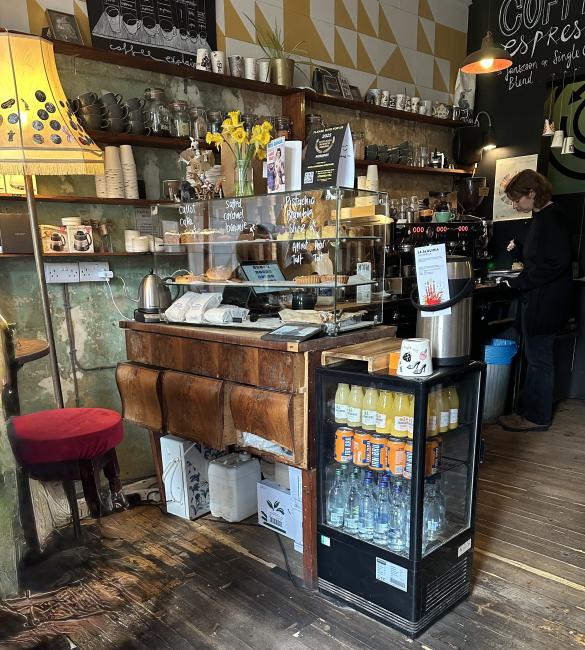
Port in a storm
In this context, Artisan Roast on Broughton Street feels like the survivor of a previous era. No cool minimalism here. It’s far more like a slightly scruffy old-fashioned pub.
The open-plan aspect encourages conversation between the baristas and the punters. Interactions often break out between customers – which is rare in most coffee places. On a recent visit, an exchange about the best Western Isles to visit broke out across four tables. (Arran was the unanimous favourite.)
The tables are a little bit wobbly, and nothing quite fits. Yet, this may make it a more democratic setting. This is evident in the clientele. When entering some of the more stylish and trendy specialty coffee places, I’m struck by the social narrowness, with a pronounced bias towards younger generations. It sometimes feels as if an invisible force field keeps out the over-45s.
But the Broughton Street Artisan Roast seems to attract a much wider spectrum. On recent visits, I’ve been struck by how similar those in the café are to what you might expect in a middle-of-the-road pub. It’s not somewhere people need to dress up for but a place to drop into and feel immediately relaxed.
I recently found myself there just before the heavens opened. Sitting near the window, sipping a well-crafted cortado, I felt snug as I watched the torrents start to stream down the emptying street. A great port in a storm.
Cultured clientele
The whole vibe is a slight step back in time. the music pulsing through the stereo is often classic 60s and early 70s rock; Stones, Doors, Led Zep, Cream etc. Some of the customers may have been around during the era these sounds were first released. If only they’d kept the original vinyl ...
The place has a slightly bohemian feel. On two of my last three visits, I have seen Robert McDowell, Director of Summerhall, sipping his Americano, conversing on varied topics and completing The Times crossword. Perhaps he enjoys getting away from the stresses that have engulfed his project in recent times.
That’s the sort of older, cultured vibe the place has. Among the customers there seems to be less of a focus on screens – I’ve seen several people reading physical newspapers, while copies of the Spurtle in the magazine rack are well thumbed. Again, a sense of a step back from the modern world.
The furniture is what might be described as shabby chic, showing plenty of wear and tear. The items evidently weren’t designed with a café in mind. However, as highlighted by the pew in the front section, there’s a lot of creditable repurposing going on here, in line with the original speciality-coffee vibe.
Artisan Roast has four locations around the city. The differences between them suggest a significant amount of managerial autonomy. Though of a similar size, the Bruntsfield one has a less cluttered feel while still preserving character with a very tasteful refit highlighting the traditional slatted wooden interior. All of Artisan Roast’s locations have a natural warmth, though the Broughton Street branch has a darker feel.
What about the coffee?
I’ve detected some variety in quality across the branches, though I sense this has improved in recent months. I would pick out the Bruntsfield branch as serving the very best among the four, though the Broughton Street offer also seems consistent. As espresso-based drinks start to hit the £4 mark, you really want to be getting a good-quality drink for that. The baristas here seem to show the correct level of focus that you need to extract the rich, crema-laden goodness from the beans.
The coffee geeks I talk to don’t often consider Artisan Roast as one of the best coffee places in the city. However, it’s a very solid performer.
Plus, they offer something a little bit different in terms of atmosphere and aesthetic. As the coffee scene in the city evolves, it’s good to see such variety being maintained.*
One defining aspect of specialty coffee is its embrace of different flavour profiles, unlike Italian espresso, which has a very uniform flavour profile. It’s good to see that diversity in the character of cafés is being maintained – eccentric little places, like Broughton Street’s Artisan Roast, offering a break from minimalism and a warmer welcome to a wider range of customers.
* Another of my favourites is Throat Punch Coffee in Dalry, whose robusta-based coffee really does pack a punch. The place is interesting, generally with two dogs in situ who often provide the focus for customers.

*****




